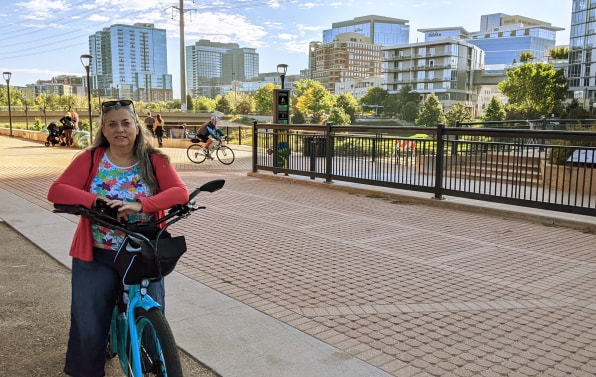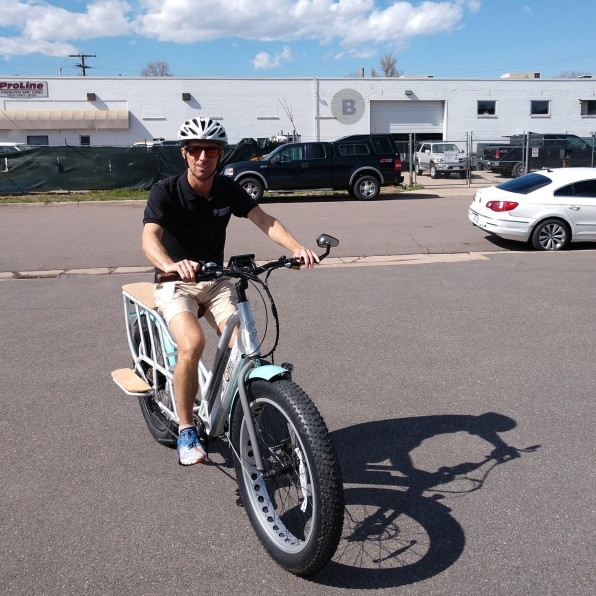Denver spent $4.1 million to get more people on e-bikes. It worked
When Denver started offering a rebate for residents to buy electric bikes, the city thought that the funding would last for three years. Instead, so many people wanted to participate that it was gone in six months.
The first set of 3,000 vouchers—with $400 for a standard rebate, $1,200 for low-income residents, and an extra $500 for anyone buying an electric cargo bike—were claimed within days of the program’s launch last April. Then the city released more vouchers in July, and “they were gone in 22 minutes,” says Grace Rink, the city’s chief climate officer. “We thought it might be popular. We just didn’t know how popular it was going to be.”
To date, 4,156 vouchers, worth a total of more than $4.1 million, have been redeemed at local bike shops. This fall, Rink plans to ask the city council for funding to add more vouchers in 2023.

Denver is aiming to reach net zero emissions as a city by 2040, and cars—a major source of current emissions—are a problem. Car exhaust is also a health issue. “Transportation is the number one source of air pollution in Denver,” Rink says. Supporting e-bikes, which are obviously much cheaper than electric cars, can be a cost-effective way to help shrink both climate pollution and smog.
Unlike some energy-efficiency incentives that give a credit when people pay taxes, the rebate was available at local bike shops as an immediate discount. For low-income residents, the incentive can cover the majority of the cost of some e-bikes. The smaller voucher for other residents “gets people off the fence,” says Rink. “I think what it showed is there were a lot of people who were interested in bikes, but they just needed that little nudge to actually get them into the marketplace.”
Luca Andreu, one Denver resident, hadn’t been considering getting an e-bike, but found out about the city’s voucher program after their car was stolen. Andreu had planned to get a new car after getting the insurance payment but got an e-bike through the program instead, and now uses it to get everywhere. (In Andreu’s case, the voucher covered the entire cost of a cargo bike from Rad Power Bikes, minus taxes and assembly, which they could handle themself.) The electric motor makes it possible to run errands and replace a car more easily than a regular bike.
“I’m an active, athletic person, and there’s absolutely no way I could go the distances that I go now to run errands without the e-bike,” Andreu says. “If you’re super busy, you can’t take half a day to go to PetSmart, for example. With the e-bike, I can get to the grocery store in less than five minutes. With a regular bike, it would probably be 30 minutes, but I don’t always have that energy.”
Another resident, Huong Dang, didn’t own a car before getting an e-bike with the voucher, but says that she took as many as 15 Lyft rides a month before getting it. Over the last four months, she’s taken only three, and biked a total of 856 miles. She had a regular bike before, but like Andreu, found that the electric motor transformed her habits. “Owning and using my e-bike have fundamentally changed my lifestyle,” she says. “I regularly bike 10 miles round trip to Wash park; there were weeks when I did it at least three times a week. I’ve been eating so much better at home because I get excited to bike to the grocery store and load up my two heavy-duty panniers with a ton of food.”

Ride Report, a ride-logging app that some participants chose to download in exchange for a bike shop gift card, found that 90% of recipients are riding at least once a week, and 70% are riding daily. The city also plans to survey voucher users, but already has anecdotal evidence that the program is working. “Folks tell us that they are definitely replacing car trips, and there have also been many people who have told us that they were debating getting a second car for their household, and they got an e-bike instead,” says Rink.
Denver is unusual in that it could easily fund the program; in 2020, local voters passed a 0.25% increase on sales tax to support climate action, which raises around $40 million a year. When the pandemic first began, the city worked with local organizations to set up an e-bike library for low-income workers who couldn’t get to work as bus service was disrupted. They also gave e-bikes to a food rescue organization so it could avoid driving. The new rebate was a logical next step in how to get bikes on the road.
Bike infrastructure in the city has also been improving. “Denver has come a long way in creating a system that makes it accessible for newer [riders] to try biking with an e-bike,” says Noa Banayan, director of federal affairs at the nonprofit PeopleForBikes. The city now has nearly 125 miles of bike lanes, for example, and some are separated from traffic. As more people start to ride, and drivers start expecting to continually see bikes, that can also make riding safer.
The demand for e-bikes may be even greater when gas prices are high. “As gas prices continue to be unstable and higher across the country, a lot of people are looking at replacing car trips with e-bike trips,” says Ash Lovell, electric bicycle policy and campaign director at PeopleForBikes. “I do this a lot going to the grocery store or other places. Most trips that people take are three miles or less from their home, and e-bikes can really kind of close that gap and make it so that you’re not having to pay for gas to go do those daily errands.”
When Vermont launched a smaller e-bike rebate program this summer, it also saw an immediate response. Now, other states are planning to offer similar rebates, including Massachusetts, Connecticut, Hawaii, and Colorado. For a program to really succeed, it should be paired with plans to improve bike lanes, say Banayan and Lovell. It also helps to provide places to charge electric bikes and offer support for more than the bike itself. “A lot of the incentives that we’re seeing come out, especially the ones that are targeted at lower-income Americans, are also giving incentives for things like helmets and bike lights and gloves,” Lovell says.
The same type of program should happen at the federal level, too, bike advocates say. “??It should be nationalized, instead of a patchwork framework of states and cities that offer it,” says Banayan. An e-bike tax credit passed the House in the Build Back Better Act last year but was cut from the final Inflation Reduction Act. Now, Banayan says, programs like Denver’s can help gather more evidence that a federal program should happen.
(15)


